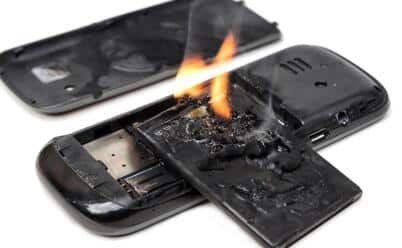Lithium Battery Disposal Near Me
Lithium batteries have become ubiquitous in our modern world, powering everything from our smartphones to our electric vehicles. However, as with any technology, these batteries eventually reach the end of their life and need to be disposed of properly.
There have been real-life examples of people improperly handling lithium-ion batteries, which can lead to dangerous consequences.
For example, in 2016, Samsung had to recall all of its Galaxy Note 7 smartphones due to a defect in the battery that caused them to catch fire and explode. This defect was caused by a manufacturing error that caused the positive and negative electrodes to come into contact with each other, leading to a short circuit.
Another example is when lithium-ion batteries are punctured or damaged, they can release a flammable and highly reactive electrolyte. If this happens, the electrolyte can ignite and cause a fire or explosion. There have been reports of batteries catching fire in e-cigarettes, hoverboards, and even electric cars.
It’s important to handle lithium-ion batteries properly and follow the manufacturer’s instructions to avoid any potential dangers. This includes storing them in a cool, dry place, avoiding puncturing or damaging them, and not overcharging them.
With the growing concern about the environmental impact of electronic waste, many people are searching for options for lithium battery disposal near them. Fortunately, there are a variety of resources available to help individuals and businesses safely and responsibly dispose of lithium batteries. In this article, we will explore the different options for lithium battery disposal, the importance of proper disposal, and how to find disposal locations near you.
Why is Proper Lithium Battery Disposal Important?
- Fire Hazard: Lithium batteries can pose a significant fire hazard if not disposed of properly. If damaged or punctured, they can release highly flammable electrolytes that can ignite and cause fires.
- Recycling: Lithium batteries are highly recyclable, and the materials inside them can be used to create new batteries or other products. Proper disposal ensures that these valuable resources are not wasted.
- Legal Compliance: Many countries and states have regulations that require proper disposal of lithium batteries. Failure to comply with these regulations can result in fines and legal consequences.
- Safety: Improperly disposing of lithium batteries can pose a safety risk to individuals handling them. For example, if a lithium battery is disposed of in the trash and then crushed, it can explode or release toxic fumes. Proper disposal ensures that individuals handling the batteries are safe and protected. The toxic chemicals in lithium batteries can also pose health risks to humans if not disposed of properly. Exposure to these chemicals can cause respiratory problems, skin irritation, and other health issues.
- Resource Conservation: Proper disposal of lithium batteries ensures that valuable resources such as lithium, cobalt, and nickel are conserved and not wasted. These materials are finite and have become increasingly important in our modern technology-dependent world.
- Preventing Contamination: Improperly disposed of lithium batteries can contaminate the environment during transportation and storage. Proper disposal methods prevent contamination from occurring.
- Protecting Wildlife: Wildlife can mistake discarded lithium batteries for food, leading to ingestion of toxic materials and injury or death. Proper disposal methods ensure that these batteries do not end up in wildlife habitats.
- Environmental Protection: Lithium batteries contain toxic chemicals such as lithium, cobalt, and lead that can leach into the soil and water if not disposed of properly. This can harm plants and animals and contaminate the ecosystem.
How Can I Dispose of Lithium Batteries Near Me?
- Overview of the different options for lithium battery disposal
- Explanation of how to find a recycling facility near you
- Discussion of the different types of lithium batteries and their disposal requirements
The proper way to dispose of lithium batteries depends on the size and type of the battery.
Here are some general guidelines for disposing of lithium batteries:
- Recycle – Many recycling centers accept lithium batteries, so check with your local recycling center or municipal waste facility to see if they have a program for recycling these batteries. Many retail stores, such as Best Buy and Staples, also offer battery recycling programs.
- Contact the manufacturer – Some manufacturers have programs for disposing of their batteries, so check with the manufacturer to see if they have a take-back program.
- Use a battery disposal service – There are several companies that specialize in battery disposal, and they can safely and properly dispose of lithium batteries. You can find these companies by doing a quick online search for “battery disposal services near me.”
- Do not throw them in the trash – It’s important not to throw lithium batteries in the trash, as they can be a fire hazard and can also leak hazardous chemicals into the environment.
Remember, it’s important to properly dispose of lithium batteries to prevent harm to the environment and to avoid potential fire hazards.
Can I Recycle Lithium Batteries at Specific Retailers?
Yes, many retailers offer recycling programs for lithium batteries. Here are a few examples of retailers that offer battery recycling programs:
- Best Buy: Best Buy has a recycling program for rechargeable batteries, including lithium-ion batteries. You can drop off your used batteries at any Best Buy store.
- Staples: Staples has a battery recycling program that accepts a variety of batteries, including lithium batteries. You can drop off your used batteries at any Staples store.
- Home Depot: Home Depot has a battery recycling program that accepts rechargeable batteries, including lithium batteries. You can drop off your used batteries at any Home Depot store.
- Lowe’s: Lowe’s has a recycling program for rechargeable batteries, including lithium batteries. You can drop off your used batteries at any Lowe’s store.
When recycling lithium batteries, it’s important to follow the guidelines provided by the retailer or recycling center. Most recycling programs will ask that you place the batteries in a clear plastic bag or tape the terminals to prevent any accidental fires. By properly recycling your lithium batteries, you can help protect the environment and reduce the risk of fire hazards.
Frequently Asked Questions
- Answers to common questions about lithium battery disposal, such as:
- How do you dispose of lithium batteries in hazardous waste?
When disposing of lithium batteries in hazardous waste, it’s important to follow the guidelines set by your local waste management facility. They may require the batteries to be packaged in a specific way or dropped off at a designated facility. Contact your local waste management facility or a hazardous waste disposal service for guidance on how to properly dispose of lithium batteries as hazardous waste.
- Can you put batteries in general waste?
No, you should not put batteries in general waste. Batteries contain hazardous materials and chemicals that can harm the environment and human health if they are not disposed of properly. It’s important to recycle batteries or dispose of them as hazardous waste to prevent these materials from ending up in landfills or being incinerated
- Can lithium batteries be recycled indefinitely?
Lithium batteries can be recycled, but the number of times they can be recycled depends on the battery’s chemistry and the recycling process. Some studies suggest that lithium batteries can be recycled 20 to 30 times, while others suggest that they can be recycled indefinitely. However, the recycling process is complex, and there are still challenges to overcome in terms of cost and efficiency.
- Can Tesla batteries be recycled?
Yes, Tesla batteries can be recycled. Tesla has developed its own battery recycling program to recover valuable materials from used batteries, such as lithium, nickel, cobalt, and aluminum. This process reduces the environmental impact of battery production and helps to create a more sustainable supply chain for these materials.
- Are lithium batteries becoming obsolete?
No, lithium batteries are not becoming obsolete. In fact, the use of lithium-ion batteries is increasing in many industries, such as electric vehicles, renewable energy storage, and consumer electronics.
Prev Article: How does a Smart Battery Work
Next Article: Lithium Ion Battery Recycling Near Me



Leave A Comment